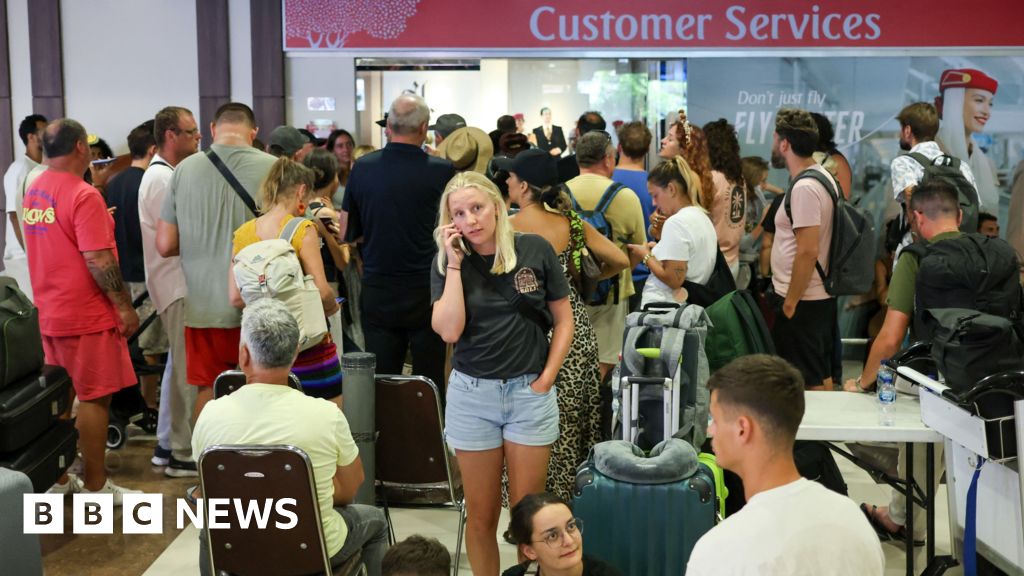Business
Walmart CEO Doug McMillon to retire in January after nearly 12 years leading retailer

Walmart CEO Doug McMillon is retiring early next year, after overseeing the top U.S. retailer’s transformation into an e-commerce behemoth, the company said Friday in a filing.
The longtime CEO will be succeeded by John Furner, the Walmart U.S. CEO, on Feb. 1, according to the filing.
McMillon, who stepped into the top role at Walmart in February 2014, will officially retire as of Jan. 31. He will continue to serve as an executive officer of the company and be employed by Walmart as an advisor through Jan. 31, 2027.
Furner, 51, has been the CEO of Walmart’s U.S. business since 2019. In that role, he oversees more than 4,600 stores and the largest sector of the company. He started at the company in 1993 as an hourly associate.
Walmart Inc. President and CEO Doug McMillon delivers a keynote address during CES 2024 at The Venetian Resort Las Vegas on January 9, 2024 in Las Vegas, Nevada.
Ethan Miller | Getty Images
The announcement of the CEO transition comes only six days before the retailer is set to report quarterly earnings. Walmart shares were up 13% this year as of Thursday’s close, as the company grows its digital business and wins over more high-income shoppers.
For more than a decade, McMillon, 59, has led the retail giant and overseen the company’s growth as an e-commerce leader. He also oversaw the business during a tumultuous time marked by the Covid pandemic, supply chain disruptions, high inflation and tariff changes.
During his time leading the company, Walmart’s shares have risen more than 300%. The company’s stock closed Friday at $102.48, roughly flat.

Walmart stock since Feb. 1, 2014.
From hourly employees to CEOs
McMillon and Furner have had similar paths to the top role at Walmart. Both have spent about three decades at Walmart. They both began as hourly associates and moved up the ranks at the retail giant, serving in merchandising and operations roles. Both also served as chief executives of its warehouse club, Sam’s Club.
Walmart Inc. (NYSE: WMT) announced that its Board of Directors has elected John Furner, 51, to succeed Doug McMillon, 59, as President and Chief Executive Officer of Walmart Inc., effective February 1, 2026.
Courtesy: Walmart Inc.
In a statement, Walmart chairman Greg Penner described Furner as “the right leader to guide Walmart into the next chapter of our growth and transformation.”
“After starting as an hourly associate and being with us for over 30 years in a variety of leadership roles across all three of our operating segments, John understands every dimension of our business – from the sales floor to global strategy,” Penner added.
“Serving as Walmart’s CEO has been a great honor and I’m thankful to our Board and the Walton family for the opportunity,” McMillon said in a statement.
He said Furner’s “curiosity and digital acumen combined with a deep commitment to our people and culture will enable him to take us to the next level.”
Along with Walmart, big-box competitor Target is also poised to get a new leader in early 2026. Target announced last month that Michael Fiddelke, chief operating officer and former chief financial officer, will succeed longtime Target CEO Brian Cornell on Feb. 1.
Digital growth and workforce transformation
As the leader of Walmart, McMillon played an instrumental role in turning the nation’s largest grocer into an e-commerce giant and positioning the company to sell more advertisements and more discretionary merchandise, along with dozens of eggs and gallons of milk.
During his early years as CEO, McMillon greenlit the $3.3 billion acquisition of Jet.com in 2016, an e-commerce startup that Walmart hoped would fuel digital growth and give it credibility as it tried to fight back against Amazon’s meteoric rise.
The startup’s acquisition — particularly its steep price tag — prompted debates in retail circles about whether the retail giant had overpaid for the asset and if that move was needed to help Walmart navigate a rocky entry into the world of e-commerce. Yet the deal gained Walmart talent with digital know-how, particularly Jet.com founder and serial entrepreneur Marc Lore who had sold his previous company, Quidsi, the parent of Diapers.com, to Amazon and worked for Amazon for years.
During Lore’s years as leader of Walmart’s U.S. e-commerce business, Walmart bought digital native businesses including menswear company Bonobos and birthed other in-house concepts, such as mattress brand Allswell. Walmart later sold Bonobos and other digital businesses, and shuttered Jet.com in 2020.
Though the Jet.com deal did not meet some Wall Street investors’ expectations, McMillon on a call with analysts at the time credited the acquisition for “jump-starting the progress we have made the last few years” in digital growth and curbside pickup and delivery.
Over the past five years, Walmart has leaned on its membership program, Walmart+, and its third-party marketplace as it tries to fend off Amazon’s e-commerce dominance. It launched Walmart+, its own subscription service and its answer to Amazon Prime, in 2020 and has continued to add perks like streaming through Paramount+.
Through its third-party marketplace, it has bulked up its merchandise offerings on virtual shelves by leaning on independent sellers to provide its customers with a wider range of clothing items, beauty brands and even luxury handbags. The model, which mirrored Amazon’s approach, also allowed Walmart to make money in new ways, such as selling ads and fulfillment services to sellers.
A CNBC investigation earlier this year found Walmart’s marketplace boom came as it made it easier than Amazon did over time for sellers to join the platform. CNBC uncovered at least 43 vendors who had taken the identity of another business to sell on Walmart’s marketplace, and some of those accounts were offering counterfeit beauty products.
Elsewhere in the company, McMillon also shook up Walmart’s pay structure for its hundreds of thousands of employees, announcing in 2015 that the company would give a raise to half a million hourly employees and increase wages to $9 an hour — a move that at the time faced sharp criticism on Wall Street.
In more recent years, Walmart has hiked wages multiple more times. But it has faced persistent criticism from Sen. Bernie Sanders, I-Vt., and other politicians who have argued the company has failed to share enough of its profits with hourly employees through pay and benefits.
As the nation’s largest private employer, Walmart has also been closely watched as the rise of artificial intelligence brings workforce changes and could threaten employment.
McMillon recently said that AI “is going to change literally every job.”
In a statement, McMillon referred to the growth of AI being a new dynamic facing his successor. And, he said, Furner is “uniquely capable of leading the company through this next AI-driven transformation.”
Business
Labour parliamentarians urge UK Government to oppose Rosebank oil field

Labour MPs are among a group of more than 60 parliamentarians to have made public their opposition to the planned Rosebank oil field – with one of Sir Keir Starmer’s backbenchers urging the Government to rule against the development and take a stand “against Trump, Reform and their fossil fuel paymasters”.
Clive Lewis is one of more than 50 MPs at Westminster who have signed a pledge from campaign group Uplift to “oppose the Rosebank oil field” and instead “advocate for a properly funded just transition for oil and gas workers and communities”.
Urging the Government to reject the development, Norwich South MP Mr Lewis said: “We must stand our ground against Trump, Reform and their fossil fuel paymasters.
“Approving an enormous new oil field would mean caving in to their anti-climate, anti-renewables agenda that runs completely counter to our values and our long-term interests.”
Scottish Labour MP Chris Murray, another of the Labour MPs to have signed the pledge, said the decision on Rosebank was “an opportunity for the Government to change course”.
It comes as the UK Government continues to consider whether the development of the oil field can go ahead – with Labour now under mounting pressure after the loss of the Gorton and Denton by-election to the Greens on Thursday.
Rosebank, which lies about 80 miles west of Shetland, is the UK’s largest untapped field, containing up to an estimated 300 million barrels of oil.
Drilling there was approved by the Conservative government in 2023 but was then subject to a legal challenge in the wake of a Supreme Court ruling which said the emissions created from burning fossil fuels should be considered when granting permission for new sites.
Now the decision on whether it can proceed lies with Labour ministers – with some 16 Labour MPs having made plain their opposition to the development.
The group includes Mr Lewis, Mr Murray, former Labour shadow chancellor John McDonnell and Scottish Labour’s Brian Leishman.
Former Labour MPs Jeremy Corbyn and Diane Abbott have also signed the pledge, along with a number of Liberal Democrat and Green MPs, SNP MP Chris Law, Plaid Cymru’s Liz Saville Roberts and Paul Maskey of Sinn Fein.
In Scotland a number of Labour MSPs have signed the pledge, along with Green MSPs – including the party’s Scottish co-leader Ross Greer – and former SNP health secretary Michael Matheson.
While previous Scottish first ministers Nicola Sturgeon and Humza Yousaf made plain their opposition to Rosebank, First Minister John Swinney has insisted the Scottish Government takes a “case-by-case approach” to new oil and gas developments, stressing these should only proceed if found to be compatible with climate change targets.
Mr Lewis said opposing Rosebank would “show that a Labour Government will stand by the promises we made to the country”.
He added: “There are only so many times we can afford to make mistakes and then change course.
“With Rosebank, we have an opportunity to get it right the first time.”
Mr Murray, the Labour MP for Edinburgh East and Musselburgh, said many locals in his constituency were “deeply concerned about Rosebank and rightly so”.
He added: “Climate change is one of the reasons I came into politics, and opening new oil and gas fields is simply incompatible with our climate commitments.
“With the North Sea’s oil supply dwindling, Scotland’s energy sector must transition to clean energy, or workers risk being left behind.”
Scottish Labour MSP Mercedes Villalba, who has also signed the pledge, argued that “approving projects like Rosebank will lock us into a toxic dependence on volatile, conflict-ridden fossil fuels”.
This would create “another excuse to delay the urgent investment needed to create secure, well-paid jobs for Scotland’s workers”, she added.
Ms Villalba said: “In an increasingly uncertain world, where climate action is relegated in favour of fossil politics, the UK and Scotland must lead the way on the clean energy transition.”
Wera Hobhouse, Liberal Democrat MP for Bath, said people in her constituency and across the country “are already facing the consequences of an increasingly unstable climate”.
Highlighting the impact of flooding and “skyrocketing food prices”, she said that “climate impacts are now a daily reality”.
Ms Hobhouse said: “Extreme weather is damaging crops, putting pressure on farmers, and destroying our precious natural environment.
“We cannot ignore these warning signs.
“A massive new oil field like Rosebank would only make matters worse.
“The emissions would be enormous, locking us into decades more pollution when we should be cutting carbon and unlocking the benefits of cheap, renewable energy.”
Approving the Rosebank development would “make a mockery of Labour’s environmental promises”, she said.
A UK Government spokesperson said: “Our priority is to deliver a fair, orderly and prosperous transition in the North Sea in line with our climate and legal obligations, which drives our clean energy future of energy security, lower bills, and good long-term jobs.”
Business
UAE stock markets close, trading halted by Abu Dhabi Securities Exchange and the Dubai Financial Market for two days amid Iran–US–Israel war fallout – The Times of India

In an unprecedented economic response to escalating regional conflict, the United Arab Emirates has announced that its two major financial markets, the Abu Dhabi Securities Exchange (ADX) and the Dubai Financial Market (DFM), will remain closed on Monday, March 2 and Tuesday, March 3, 2026. The decision comes as the UAE reels from a series of retaliatory Iranian strikes following coordinated US and Israeli military actions against Iran, which have destabilised Gulf business sentiment and prompted sweeping security and economic precautions.The UAE Capital Markets Authority said that keeping the exchanges closed temporarily is part of its supervisory and regulatory mandate, providing authorities and market participants time to assess the impact of recent events on financial infrastructure and investor confidence. The halt affects equities, derivatives and trading in hundreds of billions of dollars in listed assets and is among the clearest signs yet of economic shockwaves from the regional crisis.
Why UAE stock markets are paused: Regional conflict among Iran–US–Israel disrupts confidence
The closures follow Iran’s retaliatory missile and drone strikes on Gulf cities and strategic targets, including airports and other infrastructure, after a joint US–Israel offensive. These attacks have not only led to safety measures such as airspace restrictions and travel advisories but also triggered widespread business disruption across the Gulf. Major airports in Dubai and Abu Dhabi have seen operations halted or altered and commercial hubs from ports to retail centres have felt the strain.

UAE Markets Shut Down: Is This Economic Capitulation to Regional War?
Financial markets are typically among the first economic indicators affected by geopolitical instability. When investors fear prolonged unrest, they often pull funds from equities and seek so-called “safe-haven” assets like gold, sovereign debt or commodities such as oil, especially when conflict threatens critical energy supply corridors like the Strait of Hormuz.
Regional market turmoil and knock-on effects in the Middle East amid Iran–US–Israel clashes
While the UAE exchanges are closed, other Gulf markets that remained open on Sunday experienced significant sell-offs as investors reacted to the turmoil:
- Saudi Arabia’s benchmark index saw sharp drops before partially recovering as investors weighed conflict risks against energy price gains.
- Muscat and other regional bourses also slid, reflecting broader risk-off sentiment.
- In Kuwait, authorities took the rare step of suspending trading indefinitely due to “exceptional circumstances” linked to the same regional tensions.
Financial markets are serving as a barometer of risk and economic confidence and the dramatic moves across the Gulf underscore how intertwined political stability is with economic performance in the region.
What the UAE’s stock market closure means for investors
For both domestic and international investors, the temporary shutdown of ADX and DFM has several implications. Liquidity and price discovery are paused, leaving billions of dollars in listed assets in limbo. Risk premiums on Gulf assets may rise, as traders reassess exposure during periods of heightened uncertainty. Investor sentiment is likely to remain fragile until there are visible signs of de-escalation or credible diplomatic resolutions.Economists note that halting trading does not eliminate market pressure, it simply delays it and when markets do reopen, there may be sharp moves as investors recalibrate positions based on new geopolitical and economic realities. The conflict has not just shaken stock markets, energy markets have also reacted. Reports from analysts indicate that crude oil prices have surged as fears of supply disruptions increase, with the Strait of Hormuz, a crucial passage for roughly 20% of global oil exports, under theoretical threat of closure.

UAE Stock Markets Closed: What Does This Mean for Global Investors Amidst Escalating Conflict?
Higher oil prices can partially offset stock market pain in energy-exporting economies like the UAE but the overall economic impact remains complex. Other sectors, from tourism and hospitality to trade and logistics, have also felt immediate fallout: airport shutdowns have stranded travellers and corporate events and networking key to Ramadan business cycles have been postponed, compounding uncertainty.
UAE government messaging and future prospects
UAE authorities have stressed that public and economic safety remain top priorities. The temporary market closure is coupled with broad advisories across transportation, education and public services, such as airports issuing travel advisories and schools moving to remote learning, aimed at ensuring operational stability while the situation evolves. Officials have pledged to monitor conditions closely and communicate updates on any further market action. This includes potential rescheduling of reopening dates for ADX and DFM or additional measures to support investors once trading resumes.The UAE Capital Markets Authority ordered a two-day closure of the Abu Dhabi and Dubai stock markets on March 2–3, 2026, in response to escalating regional tensions. The pause follows retaliatory strikes by Iran after US and Israeli military action, which have disrupted markets, air travel and business operations across the Gulf. Gulf markets that remained open experienced sharp declines and volatility, reflecting investor risk aversion. Oil prices and safe-haven assets have climbed as geopolitical risk fuels global economic uncertainty. Authorities will continue to assess and communicate market developments as conditions evolve.
Business
Flights cancelled as new travel warnings issued after US-Israeli strikes on Iran

BA and Virgin Atlantic are among major airlines to ground services to the Middle East in light of the attacks.
Source link
-

 Politics1 week ago
Politics1 week agoPakistan carries out precision strikes on seven militant hideouts in Afghanistan
-

 Business1 week ago
Business1 week agoEye-popping rise in one year: Betting on just gold and silver for long-term wealth creation? Think again! – The Times of India
-

 Sports1 week ago
Sports1 week agoKansas’ Darryn Peterson misses most of 2nd half with cramping
-

 Tech1 week ago
Tech1 week agoThese Cheap Noise-Cancelling Sony Headphones Are Even Cheaper Right Now
-

 Entertainment1 week ago
Entertainment1 week agoSaturday Sessions: Say She She performs "Under the Sun"
-

 Sports1 week ago
Sports1 week agoHow James Milner broke Premier League’s appearances record
-

 Entertainment1 week ago
Entertainment1 week agoViral monkey Punch makes IKEA toy global sensation: Here’s what it costs
-

 Sports1 week ago
Sports1 week agoFloyd Mayweather to come out of retirement again











